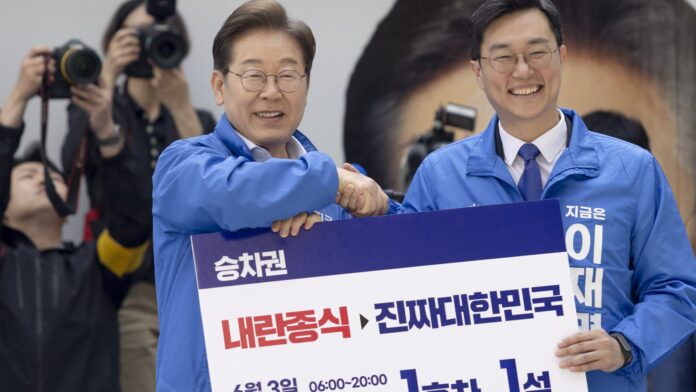Lee Jae-myung, the presidential candidate of the Democratic Party of Korea, poses for a photo after receiving a symbolic ticket for the ”Lee Jae-myung Train” from lawmaker Jang Kyung-tae during a campaign rally at Yongsan Station Plaza in Seoul, South Korea, on May 19, 2025. (Photo by Chris Jung/NurPhoto via Getty Images)
Nurphoto | Nurphoto | Getty Images
South Korea’s opposition party leader Lee Jae-myung is projected to win the country’s snap presidential election, according to a joint exit poll by broadcasters KBS, MBC, and SBS.
The exit poll put Lee’s share of the vote at 51.7%, with conservative Kim Moon-soo’s share at 39.3%.
An electoral win for the Democratic Party candidate would set him up as the country’s next leader after ousted President Yoon Suk Yeol, and determine the trajectory of South Korea’s trade negotiations with the U.S., and policies on China and North Korea.
Yoon was impeached after his short-lived declaration of martial law last December, and was removed from office by the country’s Constitutional Court in April. This triggered the snap presidential election.
Lee, who lost to Yoon by a razor-thin margin in the 2022 presidential election, held a sizable lead in opinion polling ahead of the election.
His eligibility for the presidency was in doubt after he was charged with breaching election laws, but a final ruling on the case was postponed until after the election by South Korea’s High Court.
Consultancy Eurasia Group said that, while Lee had shifted his stance to the political center in a bid to attract independent and centrist votes, he is likely to pursue a more left-leaning agenda in office.
“Key watchpoints include the size of a second supplementary budget and Lee’s approach to U.S. tariff negotiations,” the firm added.
Eurasia predicted that if Lee is elected, he will contend with the dual challenges of reviving South Korea’s economy and completing a “package” agreement with the U.S. by July.
“However, he has signaled a desire to move more slowly in talks with Washington and will likely seek to benchmark Korea’s deal against the terms negotiated by other countries, including Japan, before finalizing an agreement,” Eurasia noted.
Lee had reportedly said on May 25 that the deadline for tariff talks with the U.S. should be extended. Seoul and Washington had agreed to craft a package of deals on tariffs by July 8.
Separately, Goldman Sachs, in a May 27 note, also noted that both the PPP’s Kim and DP’s Lee share similarities in their goals, including economic growth, stable financial markets and improving housing affordability.
However, some key differences, Goldman pointed out, are in their economic policy platforms on how to promote growth.
“Mr. Lee advocates fiscal support for strategic industries, while Mr. Kim prefers revitalizing private entrepreneurship through deregulation and tax cuts. Mr. Lee aims to enhance equity markets through governance reforms while Mr. Kim wants to do it mainly through tax incentives.”
Goldman assessed that fiscal policy — using government spending and taxation to influence the economy — under the DP’s Lee is likely to be more expansionary than under Kim, and that monetary policy by the Bank of Korea will likely partly offset the gap in fiscal policy.
The BOK had recently cut rates last week to its lowest level since August 2022, saying it expects economic growth to “decline considerably.”
Regardless of the election outcome, the South Korean won is likely to appreciate against the U.S. dollar “on declining policy uncertainties after the formation of a new government and broad USD weakness against Asian currencies,” Goldman added.



